12 Best AI Tools for Business to Boost Growth in 2026
Discover the 12 best AI tools for business in 2026. Our guide reviews top platforms for marketing, sales, and operations to drive efficiency and growth.
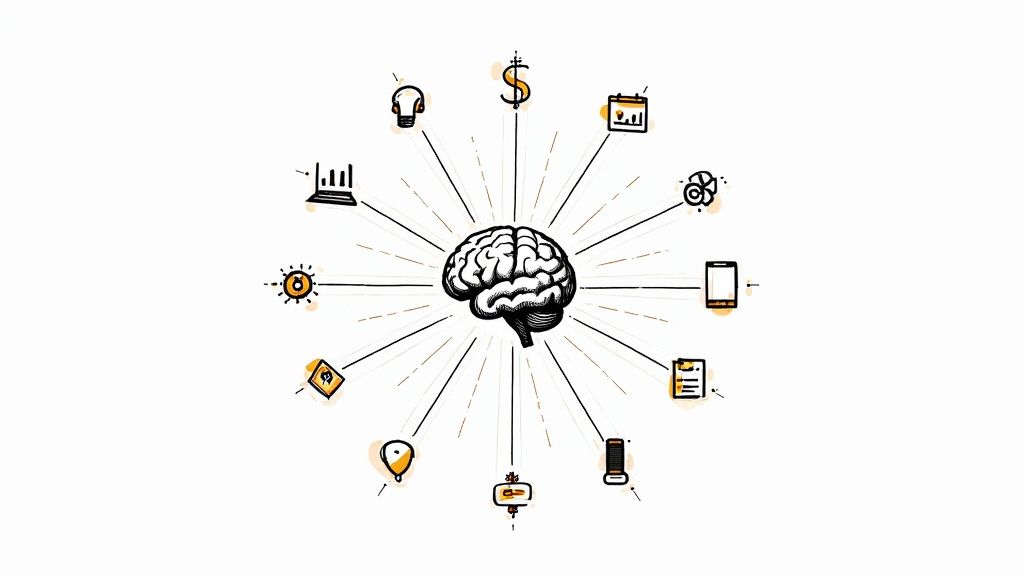
Navigating the crowded market for AI solutions can be overwhelming. Finding the right tools to streamline operations, enhance customer engagement, or drive innovation is a critical business decision. This guide is designed to cut through the noise, providing a direct and practical overview of the best AI tools for business available today. We move beyond generic feature lists to offer a detailed analysis of what makes each platform valuable. You'll find specific use cases, implementation considerations, and an honest look at each tool's capabilities.
This resource is structured to help you make informed decisions quickly. Each entry includes screenshots for a visual preview and direct links to the platforms, so you can explore them yourself. Whether you're looking to integrate AI into your CRM, automate complex workflows with AI Automation as a Service, or develop a bespoke Custom AI Strategy report, this list covers the leading marketplaces and directories. For leaders focused specifically on boosting team efficiency, our comprehensive AI productivity tools guide offers a deeper look at individual applications. Our goal is to equip you with the insights needed to select and deploy AI solutions that deliver tangible results and a clear return on investment.
1. Ekipa AI
Ekipa AI stands out as one of the best AI tools for business by moving beyond a single software solution. It functions as a comprehensive AI strategy consulting platform, designed to help organizations rapidly identify, plan, and execute AI-driven transformations without the high costs and long timelines of traditional consulting. This service is ideal for CEOs, CTOs, and operations leaders who need to bridge the gap between AI potential and tangible business results.
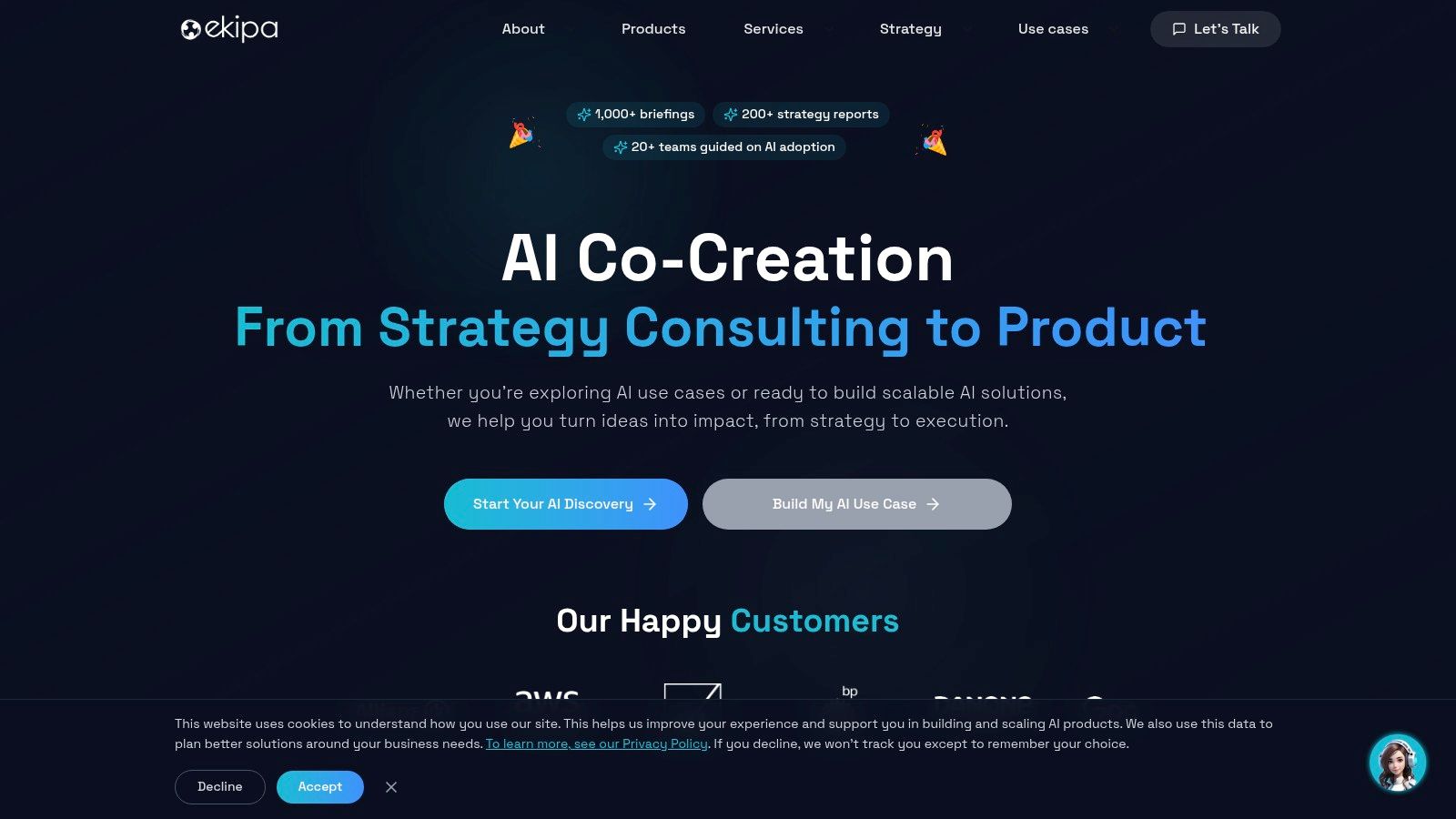
The platform’s core strength lies in its unique AI co creation model, which blends automated analysis with expert human oversight. This approach allows businesses to receive a tailored Custom AI Strategy report in as little as 24 hours. The process is comprehensive, covering everything from initial discovery and AI requirements analysis to a full AI Product Development Workflow and ongoing support.
Key Strengths and Use Cases
Ekipa AI excels in translating high-level business goals into actionable AI projects. Its services are particularly effective for mid-sized companies aiming for practical implementation rather than just theoretical roadmaps.
-
Rapid Strategy Formulation: Instead of waiting weeks for a consultant, you can use their AI Strategy consulting tool to generate an initial plan quickly. This is then refined by our expert team to ensure it aligns with your specific operational needs and long-term vision.
-
Workflow Automation: For businesses struggling with operational inefficiencies, Ekipa AI offers AI Automation as a Service. They analyze existing workflows, identify automation opportunities, and build custom internal tools or integrate solutions to reduce manual effort and cut costs. You can learn more about their custom ChatGPT solutions and how they can be tailored to your business.
-
Use Case Discovery: If you're unsure where to start with AI, the platform helps you explore hundreds of real-world use cases to find the most impactful applications for your industry, ensuring you invest in projects with the highest ROI.
| Feature | Primary Benefit | Best For |
|---|---|---|
| 24-Hour Strategy Reports | Accelerates decision-making and project kickoff. | Teams needing quick, actionable insights. |
| End-to-End Implementation | Provides a seamless transition from concept to production. | Organizations without a large in-house AI team. |
| Human-AI Co-Creation | Ensures solutions are practical and aligned with business logic. | Leaders who want control over their AI strategy. |
Ekipa AI’s approach is fundamentally practical. While it offers powerful tools, the value comes from its end-to-end service, making it a strong partner for any business serious about implementing AI effectively.
Website: ekipa.ai
2. Microsoft Commercial Marketplace (Azure Marketplace + AppSource)
For organizations already embedded in the Microsoft ecosystem, the Commercial Marketplace is less of a store and more of an integrated procurement hub. It centralizes access to thousands of third-party AI applications, pre-trained models, and services that are certified to run on Azure or integrate directly with Microsoft 365 and Dynamics 365. This platform is one of the best AI tools for business because it simplifies governance, security, and billing, which are critical hurdles in enterprise AI adoption.
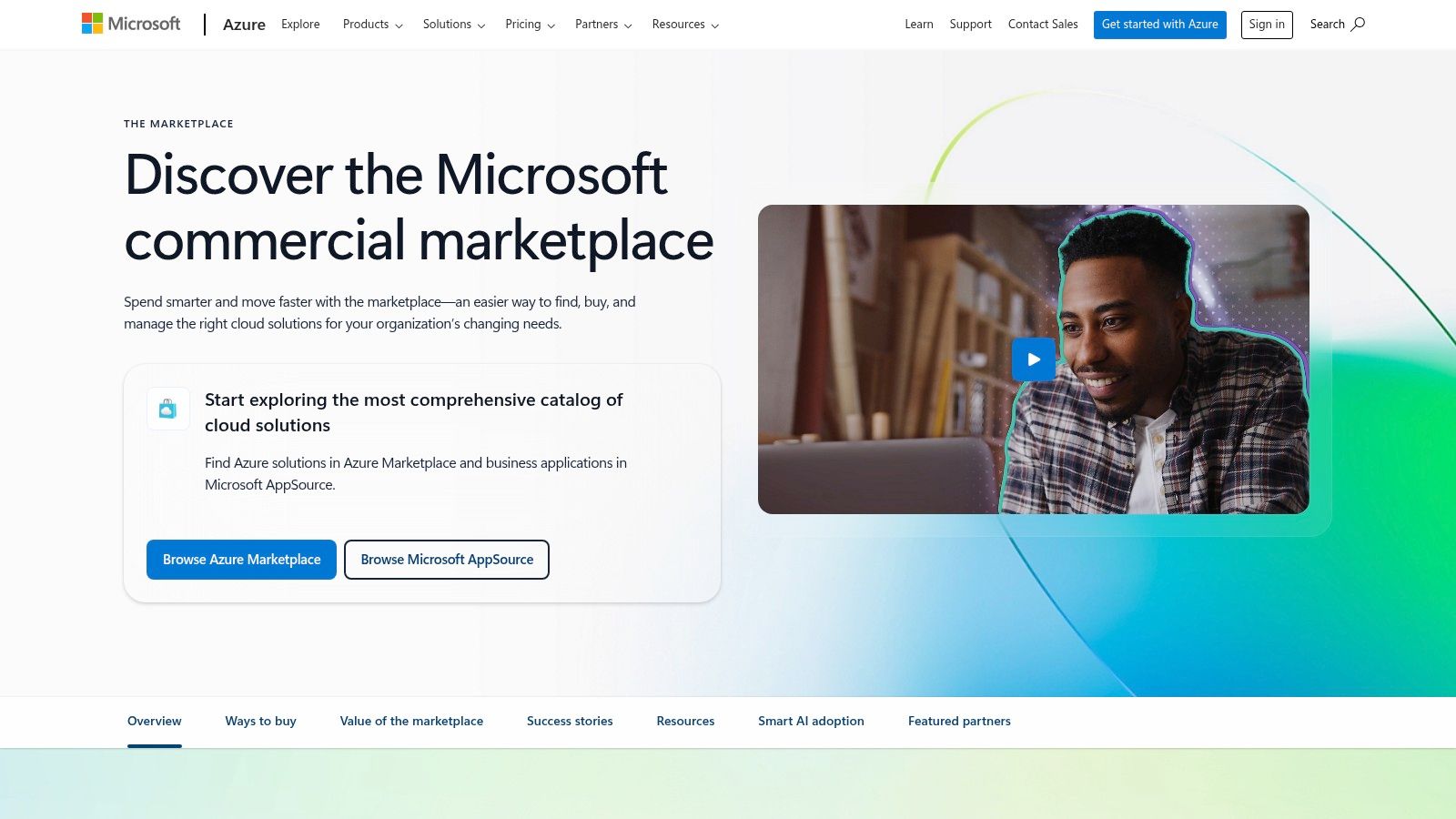
The primary advantage is streamlined procurement. You can deploy solutions and have the costs consolidated into your existing Azure bill. This avoids the complexity of managing multiple vendors and contracts. Its deep integration also means that many listed solutions offer enhanced functionality within familiar tools like Teams or Power BI, accelerating user adoption. While it’s most powerful for existing Microsoft customers, the marketplace provides a secure and efficient pathway to discover, test, and deploy enterprise-ready AI solutions.
Key Details & Differentiators
-
Best For: Enterprises using Azure, Microsoft 365, or Dynamics 365 seeking vetted, integrated AI solutions with centralized billing.
-
Unique Feature: Consolidated billing through your Microsoft tenant and the ability to negotiate private offers directly with partners.
-
Pricing: Varies by vendor; many solutions offer free trials, pay-as-you-go, or subscription models. Some are free add-ons to existing services.
-
Pros: Strong enterprise governance, simplified procurement, and deep integration with the Microsoft stack.
-
Cons: Less beneficial if your organization is not heavily invested in Microsoft’s ecosystem; some listings can redirect off-platform for purchase.
Website: https://azure.microsoft.com/en-us/marketplace/
3. AWS Marketplace (AI/ML)
For companies built on Amazon Web Services, the AWS Marketplace is the definitive source for discovering and deploying third-party AI and machine learning solutions. This curated digital catalog provides everything from foundational, pre-trained models and developer tools to full-stack generative AI applications. As one of the best AI tools for business, it excels at removing friction from the procurement and deployment process, allowing teams to launch solutions directly into their existing cloud infrastructure.
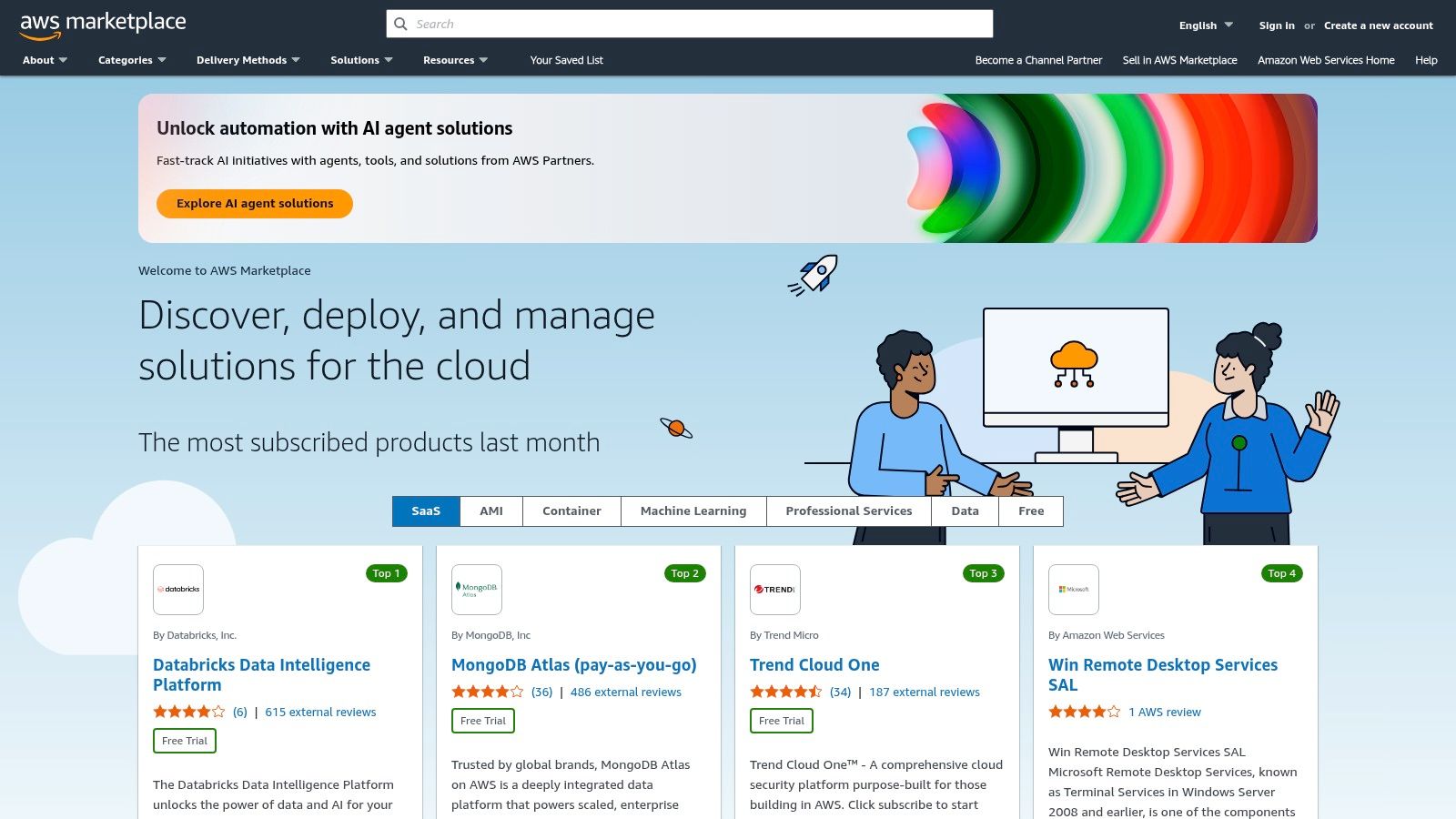
The key benefit is its native integration with the AWS ecosystem, especially Amazon SageMaker. You can find, subscribe to, and deploy algorithms and model packages with a few clicks, bypassing complex vendor onboarding. This tight integration simplifies billing by consolidating all costs onto your AWS invoice, providing clear financial oversight. While its greatest value is for AWS-native organizations, the marketplace offers an unparalleled breadth of vetted AI/ML software, making it a critical resource for innovation within the AWS cloud.
Key Details & Differentiators
-
Best For: Organizations heavily invested in the AWS ecosystem seeking to rapidly procure and deploy vetted AI/ML models and applications.
-
Unique Feature: One-click deployment of many models and algorithms directly into Amazon SageMaker, drastically reducing setup time.
-
Pricing: Varies widely by vendor; includes free trials, pay-as-you-go, and subscription models. Costs are a combination of software licensing and AWS infrastructure usage.
-
Pros: Fast deployment into AWS environments, a broad choice of vendors from startups to major providers, and standardized billing on a single AWS invoice.
-
Cons: Best suited for AWS-first environments; combined pricing for software and compute resources can become complex to manage.
Website: https://aws.amazon.com/marketplace/
4. Google Cloud (AI & Machine Learning, Marketplace listings)
Google Cloud provides a powerful and open ecosystem for businesses looking to build, deploy, and manage AI at scale. Its platform centers around Vertex AI, a unified environment for managing the entire machine learning lifecycle, from data preparation to model deployment and monitoring. This makes it one of the best AI tools for business by offering access to Google’s own state-of-the-art models like Gemini, alongside a vast library of partner models. The platform is engineered for building sophisticated AI agents and advanced search and recommendation systems.
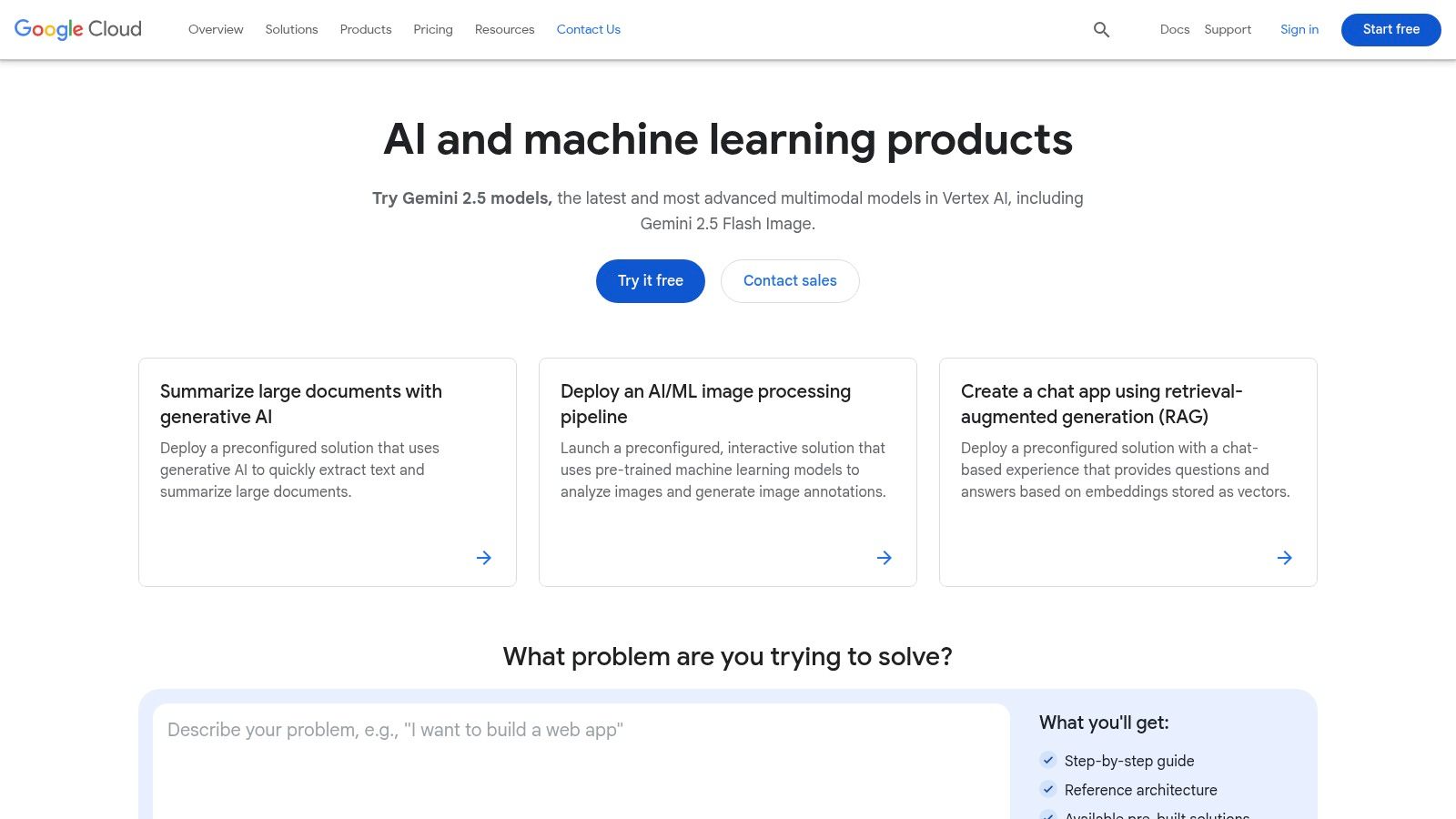
The primary advantage of Google Cloud is its flexibility and powerful tooling for creating custom solutions, particularly those involving retrieval-augmented generation (RAG) and multi-agent applications. The Google Cloud Marketplace further extends its capabilities, offering pre-built AI accelerators and deployable solutions from third-party vendors. While this ecosystem provides immense power, it delivers the most value for organizations already invested in the Google Cloud Platform, as many integrations and marketplace purchases require a GCP project setup, which can be a barrier for newcomers.
Key Details & Differentiators
-
Best For: Companies building custom AI applications, especially those leveraging search, data analytics, and multi-agent systems within the Google Cloud ecosystem.
-
Unique Feature: Vertex AI provides unified access to Google's proprietary models (like Gemini) and an extensive catalog of open and partner models.
-
Pricing: Varies widely; based on a pay-as-you-go model for specific services (e.g., API calls, model training) and vendor-specific pricing on the Marketplace.
-
Pros: Open, partner-rich ecosystem; strong tooling for RAG, search, and agent-based apps; access to cutting-edge models.
-
Cons: Most beneficial for existing GCP users; some marketplace listings require project setup before purchase, adding a setup step.
Website: https://cloud.google.com/products/machine-learning
5. Salesforce AgentExchange (evolution of AppExchange for agentic AI)
For businesses built on the Salesforce platform, AgentExchange is the next evolution of its trusted AppExchange, tailored specifically for agentic AI. It acts as a curated marketplace for discovering and deploying pre-built AI agents designed to automate complex tasks across sales, service, and marketing clouds. This platform is one of the best AI tools for business because it leverages the Einstein Trust Layer, ensuring all AI interactions are secure, auditable, and grounded in your company's own data.
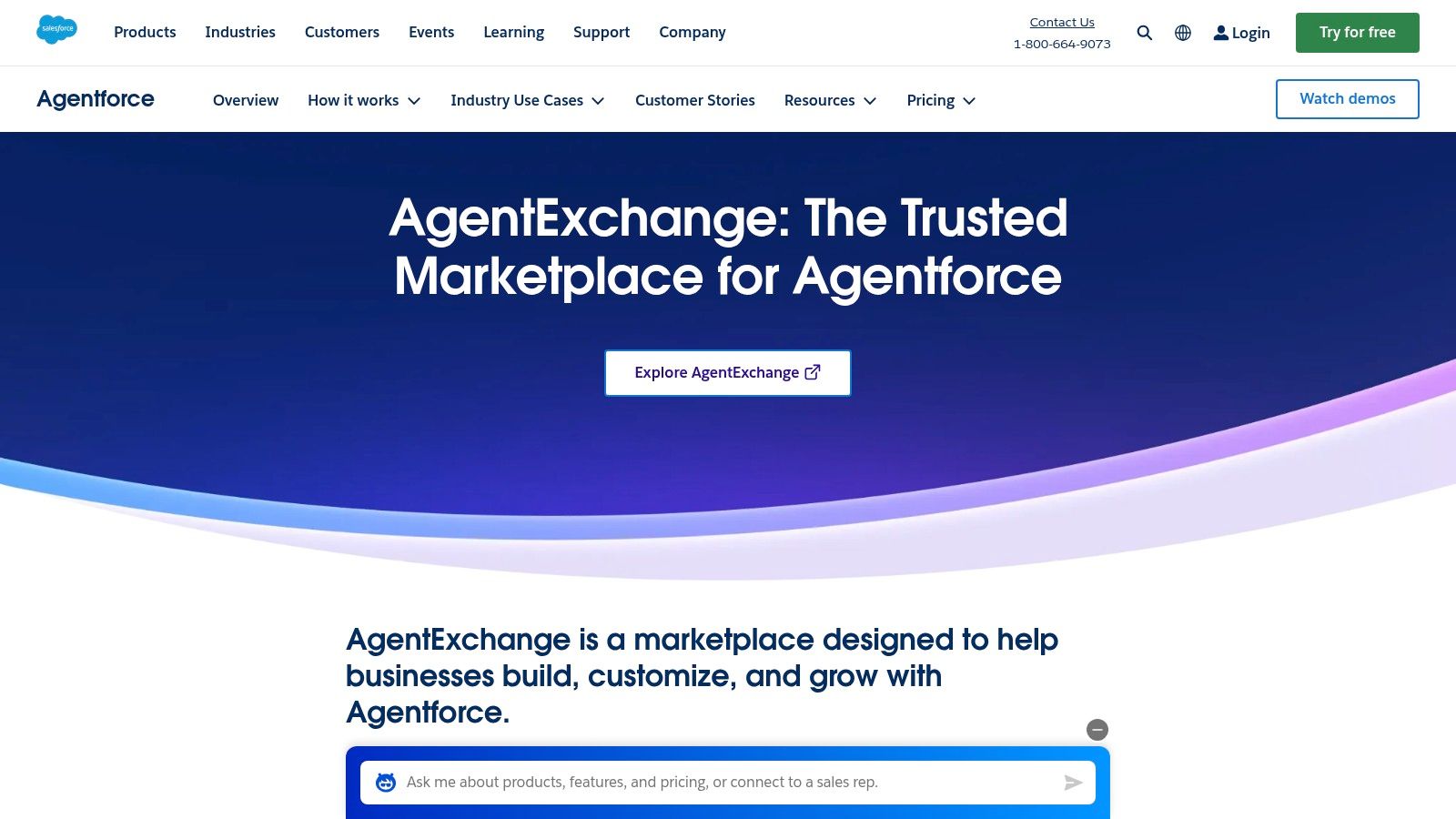
The core benefit is the deep integration with CRM data, allowing these AI agents to perform actions with rich context. For instance, an agent can autonomously analyze customer history to route a new inquiry, a process crucial for efficient Lead Routing in Salesforce. AgentExchange also provides low-code tools for businesses to build their own agents, connecting them directly to Salesforce workflows and data. This trusted, integrated approach significantly lowers the barrier to adopting sophisticated, autonomous AI solutions within an existing enterprise environment.
Key Details & Differentiators
-
Best For: Existing Salesforce customers wanting to deploy trusted, context-aware AI agents for sales, service, and marketing automation.
-
Unique Feature: The Einstein Trust Layer provides built-in security, governance, and audit trails for all agentic AI actions.
-
Pricing: Varies by partner and agent; typically involves custom pricing or subscription models requiring sales engagement.
-
Pros: Deep integration with CRM context, strong enterprise-grade compliance, and powerful administrative controls.
-
Cons: Primarily beneficial for organizations already invested in the Salesforce ecosystem; many listings require sales-assisted pricing discussions.
Website: https://www.salesforce.com/agentforce/agentexchange/
6. G2 (AI Software Categories and Rankings)
When the goal is validation and comparison, G2 stands out as the largest B2B software marketplace driven by user reviews. Instead of being a direct tool provider, it’s a critical research platform for shortlisting the best AI tools for business based on real-world feedback. G2’s extensive AI software categories, from AI Chatbots to Text-to-Speech, are populated with products ranked by verified users, providing an unfiltered look at performance, ease of use, and support quality.
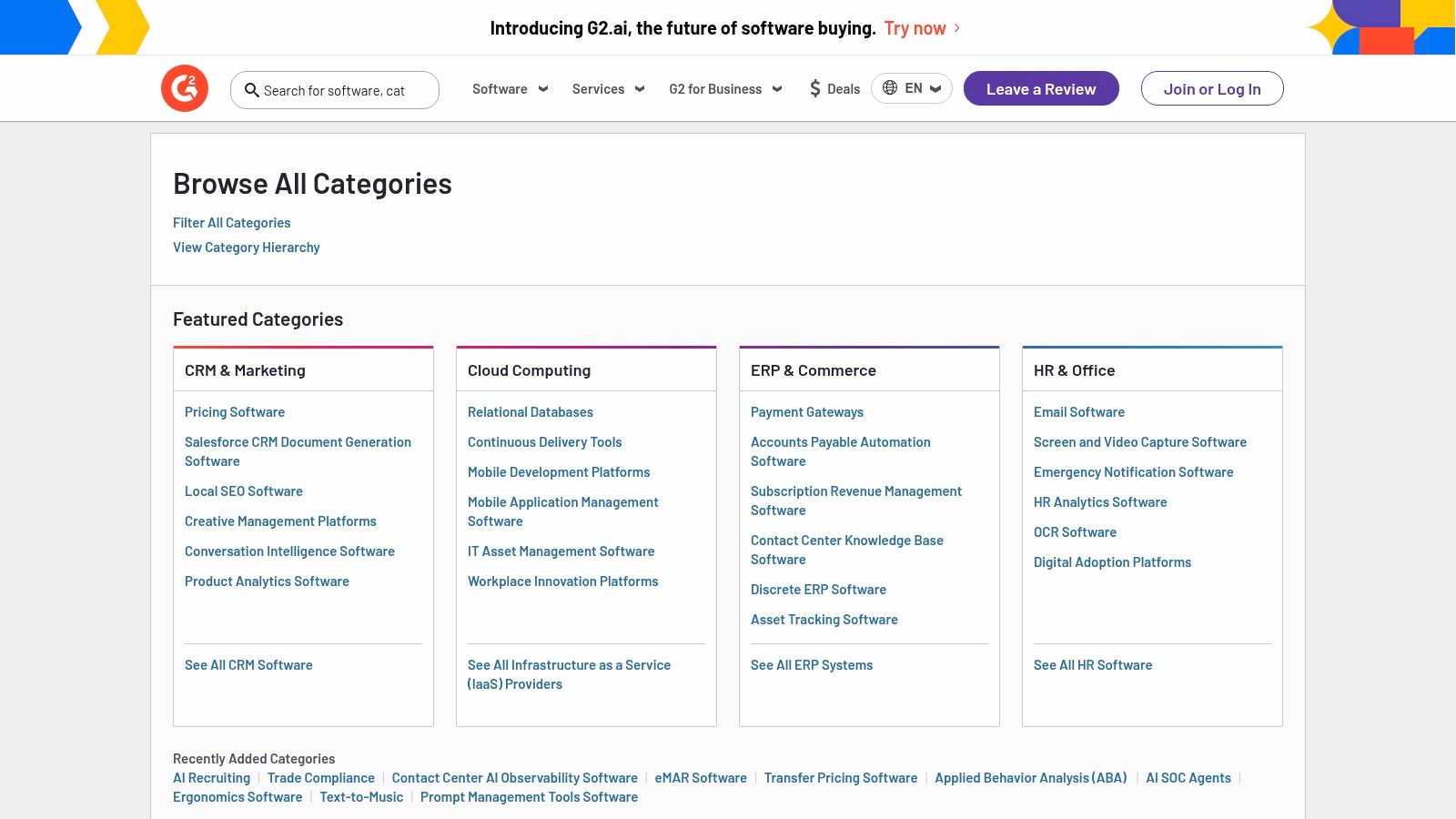
The primary advantage of G2 is its Grid methodology, which plots software based on market presence and user satisfaction, offering a quick visual reference of category leaders and niche innovators. Businesses can filter options by company size, features, and pricing models to find solutions that match their specific needs. By leveraging peer reviews, decision-makers can bypass marketing hype and gain insights into a tool’s actual ROI and implementation challenges, making it an indispensable step in the procurement process. This aligns with a thorough AI requirements analysis before committing to a new technology.
Key Details & Differentiators
-
Best For: Any business leader or IT manager conducting due diligence and looking to compare AI software based on verified peer reviews.
-
Unique Feature: The G2 Grid reports, which visually map out market leaders, contenders, and niche players based on user satisfaction and market presence.
-
Pricing: Free to browse and compare reviews. Vendors pay for enhanced profiles and lead generation features.
-
Pros: Broad coverage with a constant stream of fresh, user-generated feedback, helpful comparison grids, and market momentum indicators.
-
Cons: Lead capture forms and sponsored placements can interrupt the user experience; some niche products lack in-depth, enterprise-grade reviews.
Website: https://www.g2.com/categories/ai-software
7. Capterra (Artificial Intelligence Software Directory)
For small to mid-sized businesses, Capterra’s Artificial Intelligence Software directory is an essential starting point for market research. Rather than being a single tool, it’s a comprehensive aggregator that helps decision-makers compare hundreds of AI solutions side-by-side. The platform excels at translating complex software categories into practical business needs, making it one of the best AI tools for business discovery. Its robust filtering system lets you narrow down options by deployment type, company size, and specific features, demystifying the crowded AI market.
The primary value of Capterra is its focus on user-generated reviews and practical comparisons. It provides buyer's guides with pricing benchmarks and feature checklists, which are invaluable for creating a shortlist of vendors. This approach helps businesses move from broad exploration to focused evaluation without needing deep technical expertise. While it may lack the in-depth technical specifications of enterprise-focused platforms, Capterra’s strength lies in its accessibility and broad coverage, ensuring businesses can find a fitting tool regardless of their niche.
Key Details & Differentiators
-
Best For: SMBs and mid-market companies needing to compare a wide range of AI software with a focus on user reviews and pricing.
-
Unique Feature: Detailed filters and buyer’s guides that include pricing benchmarks and feature comparisons tailored to business users.
-
Pricing: Free to use for research; software pricing varies by vendor, with links to trials and official sites.
-
Pros: Easy to filter options and compare prices, strong SMB focus with broad vendor coverage, and extensive user reviews.
-
Cons: Review depth can be inconsistent across products; less detailed technical information for complex enterprise AI platforms.
Website: https://www.capterra.com/artificial-intelligence-software/
8. Product Hunt (AI Tools Discovery)
For businesses aiming to stay on the absolute cutting edge, Product Hunt is an indispensable discovery engine. Unlike curated marketplaces, it’s a dynamic, community-driven platform where new AI tools are launched and ranked daily. Its value lies in providing a real-time pulse on innovation, allowing teams to spot emerging solutions and niche tools long before they become mainstream. This makes it one of the best AI tools for business leaders focused on gaining a competitive advantage through early adoption.
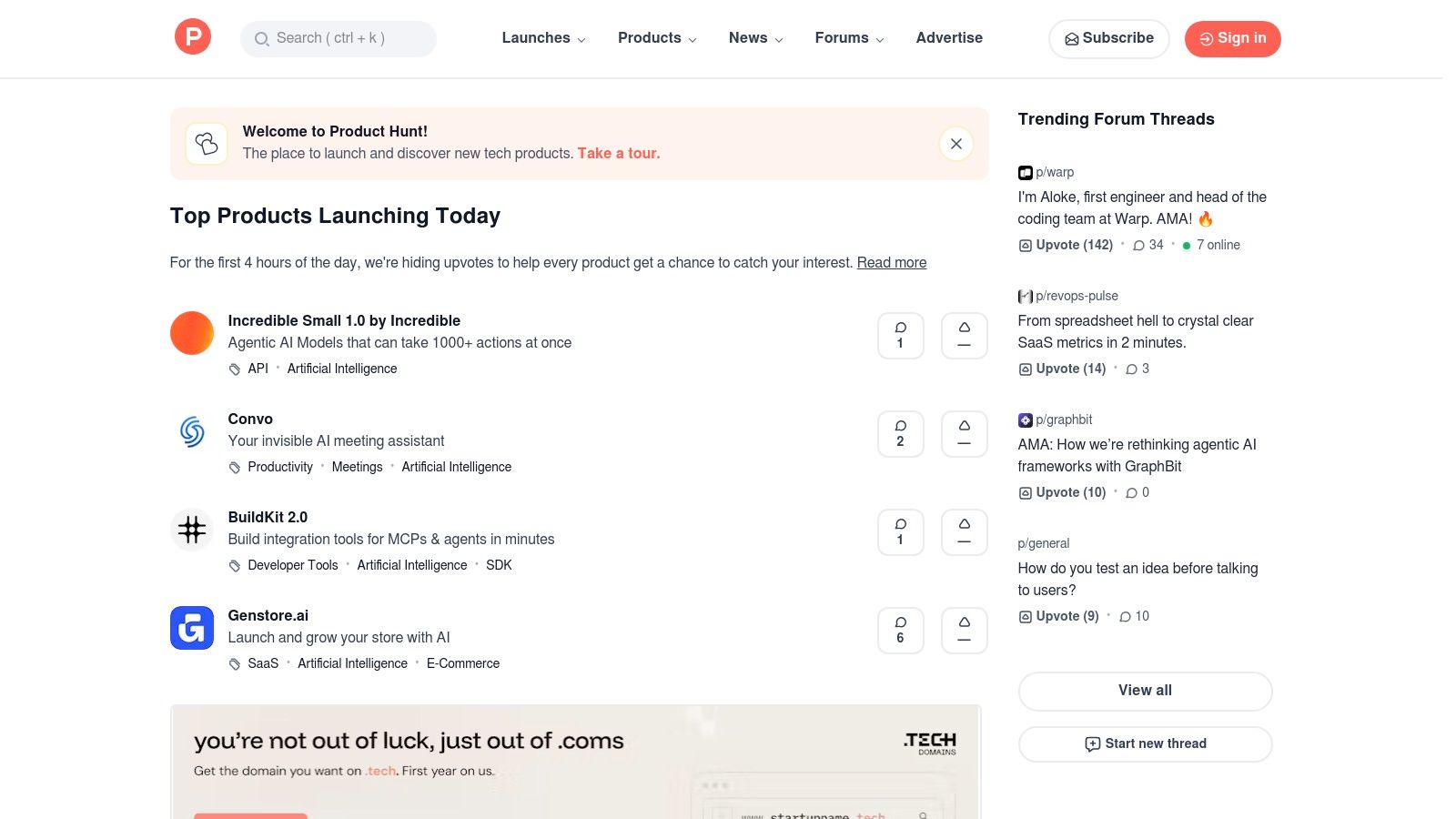
The primary advantage is unfiltered access and community validation. Users upvote, comment on, and review new launches, offering immediate, candid feedback on a tool's utility and potential limitations. This crowdsourced due diligence helps you quickly gauge if a trending tool is genuinely useful or just hype. By monitoring AI-specific collections and daily leaderboards, businesses can identify unique solutions for specific challenges, from AI-powered video editing to specialized data analysis, often engaging directly with the makers for insights.
Key Details & Differentiators
-
Best For: Innovative teams, startups, and R&D departments looking to discover and experiment with the latest AI tools as they launch.
-
Unique Feature: Daily leaderboards driven by community upvotes, providing a real-time gauge of which new tools are gaining traction.
-
Pricing: Free to browse and discover. Individual tool pricing varies, with many offering free trials, freemium, or special launch-day deals.
-
Pros: Early access to cutting-edge AI technology and honest, immediate community feedback that helps vet new products quickly.
-
Cons: Product quality and longevity vary significantly; requires internal vetting for enterprise security and scalability.
Website: https://www.producthunt.com/
9. HubSpot App Marketplace (AI for CRM, GTM, and Workflows)
For businesses built around the HubSpot CRM, its App Marketplace is an essential hub for extending capabilities with artificial intelligence. Rather than offering one monolithic AI, HubSpot provides a platform where hundreds of specialized AI applications integrate directly into your existing sales, marketing, and service workflows. This makes it one of the best AI tools for business if your goal is to enhance a specific function, like lead enrichment or sales forecasting, without leaving your core CRM environment.
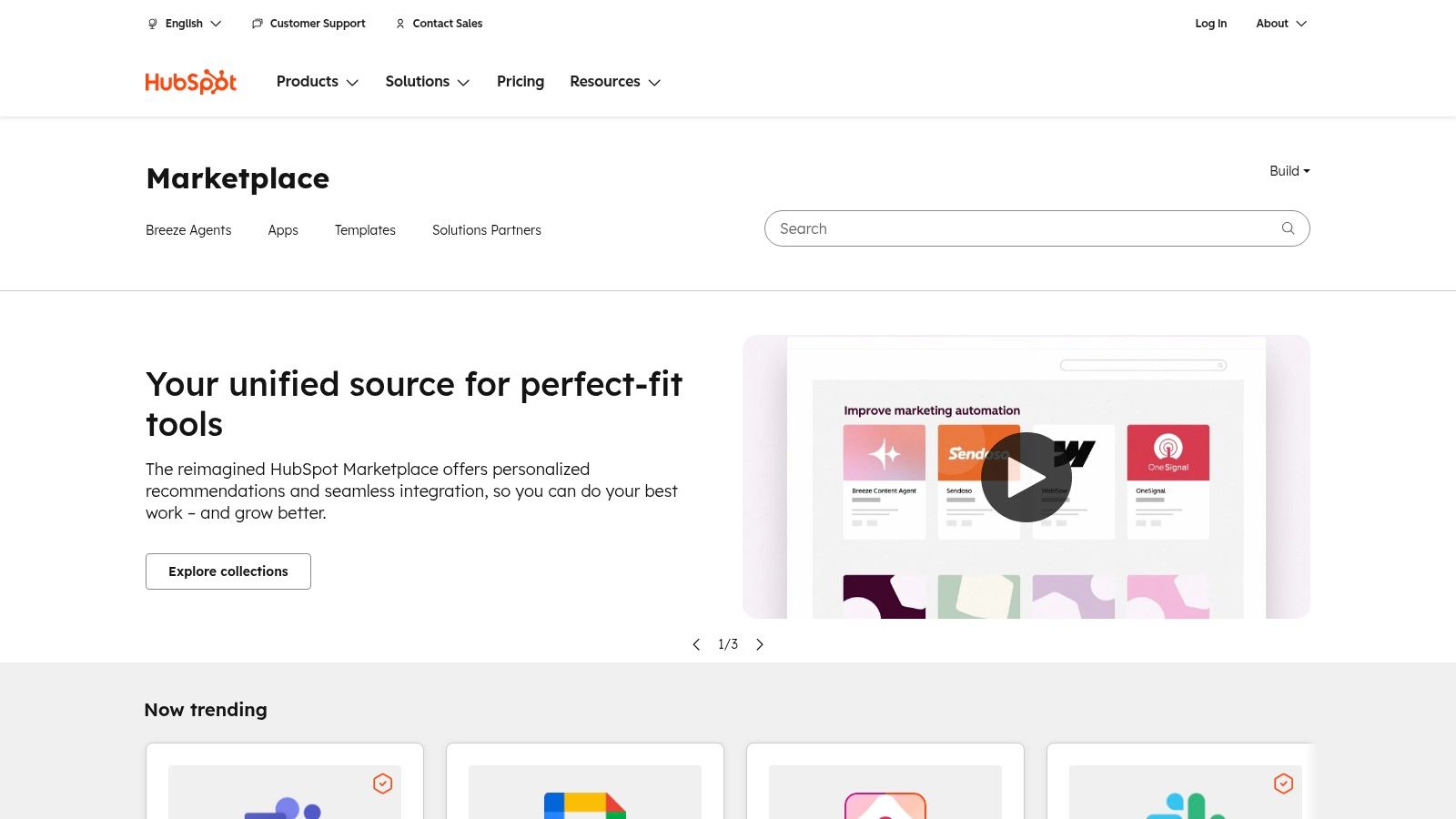
The primary benefit is context-aware automation. Since these apps plug directly into your contact, deal, and ticket data, they can perform highly relevant tasks, from summarizing call notes to drafting personalized outreach emails. Specifically for enhancing customer interactions and scaling support, powerful tools like AI customer service software for SaaS growth found in the marketplace can transform your service hub. This tight integration reduces manual admin work and ensures that AI-driven insights are immediately actionable within your go-to-market teams.
Key Details & Differentiators
-
Best For: Companies already using HubSpot who want to add targeted AI capabilities for sales, marketing, and customer service without complex integrations.
-
Unique Feature: Deep, contextual integration with HubSpot CRM data, allowing apps to automate tasks based on real-time customer and deal information.
-
Pricing: Varies by app; many offer free tiers or trials, while others require a separate subscription with the third-party vendor.
-
Pros: Tight integration with the HubSpot ecosystem, a wide variety of specialized AI tools, and user ratings to guide selection.
-
Cons: Value is almost entirely dependent on your organization's commitment to the HubSpot platform; many apps require separate vendor subscriptions and billing.
Website: https://ecosystem.hubspot.com/marketplace/
10. Slack App Directory – AI-Powered Productivity
For teams that live and breathe in Slack, its dedicated AI App Directory is the fastest way to embed intelligent automation directly into daily workflows. Instead of toggling between applications, this curated marketplace brings AI capabilities into the collaboration hub where work already happens. It features hundreds of vetted apps that handle tasks like summarizing channels, generating meeting notes, searching knowledge bases, and automating routine updates, making it one of the best AI tools for business productivity.
The primary benefit is context-aware assistance. Because these apps operate within Slack, they can access conversation history and files (with permission) to provide relevant, in-the-moment support. This seamless integration significantly reduces friction and boosts adoption. For organizations, it offers a controlled environment to deploy powerful tools, with administrators able to manage app permissions and data access centrally, a crucial step in any successful AI automation strategy.
Key Details & Differentiators
-
Best For: Businesses heavily reliant on Slack for internal communication and collaboration seeking to enhance productivity with integrated AI.
-
Unique Feature: Native integration allows AI tools to be invoked directly within Slack channels and DMs using slash commands or mentions.
-
Pricing: Varies by app; many offer freemium tiers, per-user subscriptions, or usage-based pricing. The directory itself is free to browse.
-
Pros: Access AI tools directly where you collaborate, supports a wide range of use cases (IT, support, sales, HR), and offers centralized admin controls.
-
Cons: Requires strong governance to manage app permissions and data access; value is diminished for organizations not using Slack as a central hub.
Website: https://slack.com/apps/category/At06D34LSB9C-ai-powered-productivity
11. Atlassian Marketplace (Jira/Confluence AI Apps)
For teams deeply invested in the Atlassian ecosystem, the Marketplace is an essential hub for extending the capabilities of Jira and Confluence with powerful AI. It offers thousands of third-party apps designed to streamline engineering, IT, and project management workflows. This platform is one of the best AI tools for business because it allows companies to inject intelligent automation directly into their existing processes, from auto-triaging IT tickets to summarizing complex project documentation.
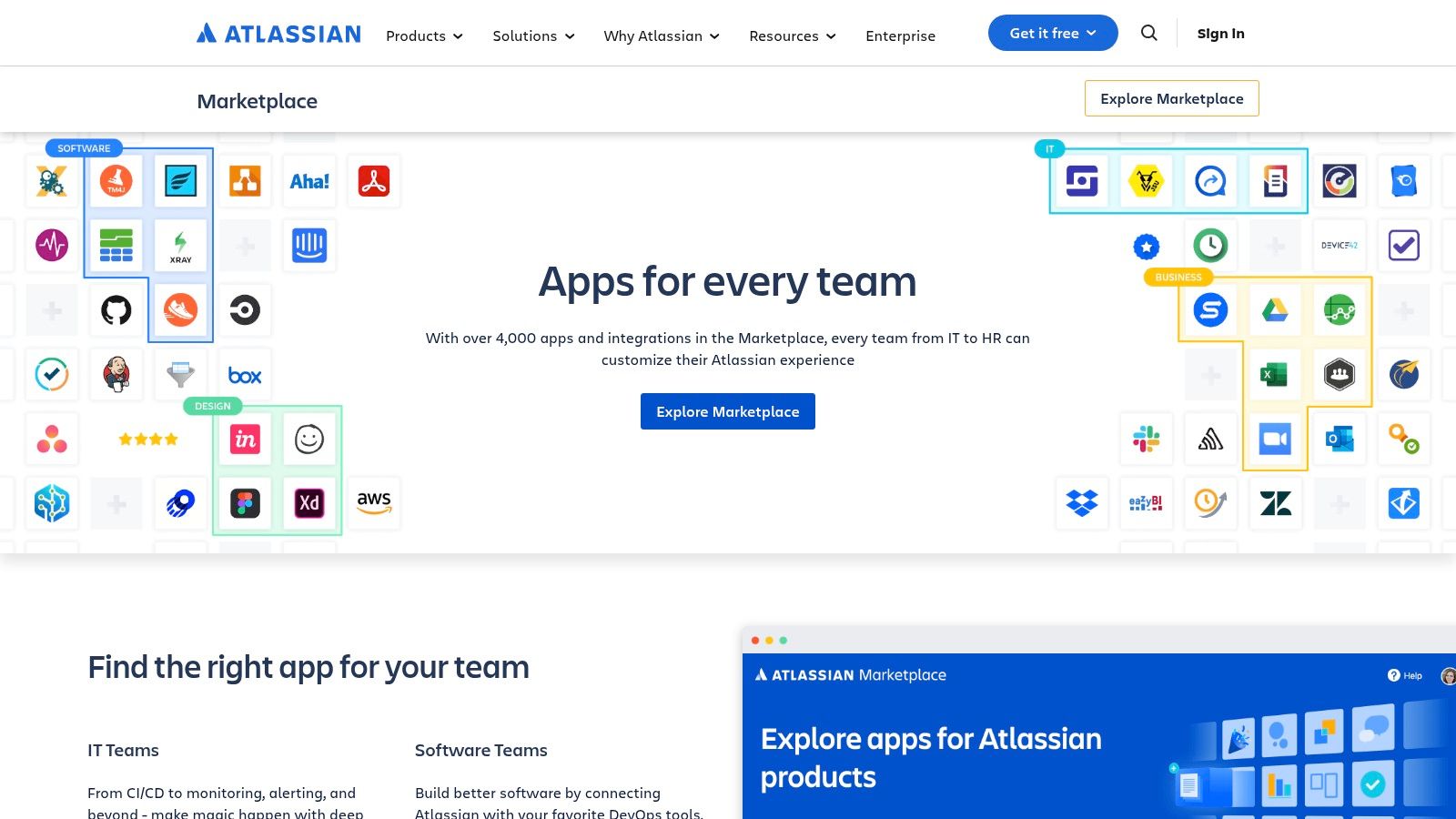
The core benefit is the seamless integration. These AI apps operate natively within the familiar Jira or Confluence interface, which dramatically reduces the learning curve and boosts adoption. Teams can enhance their AI Product Development Workflow by automating repetitive tasks, gaining predictive insights on project timelines, or using natural language to search vast knowledge bases. This targeted approach ensures that AI is applied where it has the most impact, directly improving the productivity of technical and support teams.
Key Details & Differentiators
-
Best For: Businesses using Jira and Confluence that want to enhance their engineering and IT workflows with integrated AI automation.
-
Unique Feature: A massive ecosystem of specialized AI apps that solve niche problems within the Atlassian suite, from automated testing to sentiment analysis on customer feedback tickets.
-
Pricing: Varies by app vendor; most offer free trials or tiered subscription plans based on the number of users.
-
Pros: Deep integration with core engineering and IT tools, a broad vendor ecosystem with many free trial options, and centralized billing through an Atlassian cloud site.
-
Cons: Value is highly dependent on your organization's existing adoption of Atlassian products; can lead to app sprawl without proper governance.
Website: https://www.atlassian.com/software/marketplace
12. Shopify App Store – AI-Powered Apps for Ecommerce
For the millions of merchants powering their businesses on Shopify, the official App Store has become an essential hub for AI-driven ecommerce tools. Rather than a single product, it offers a curated ecosystem of applications designed to solve specific retail challenges. This marketplace is one of the best AI tools for business in the ecommerce sector because it democratizes access to sophisticated AI, allowing even small operators to implement powerful personalization, automation, and content generation features.
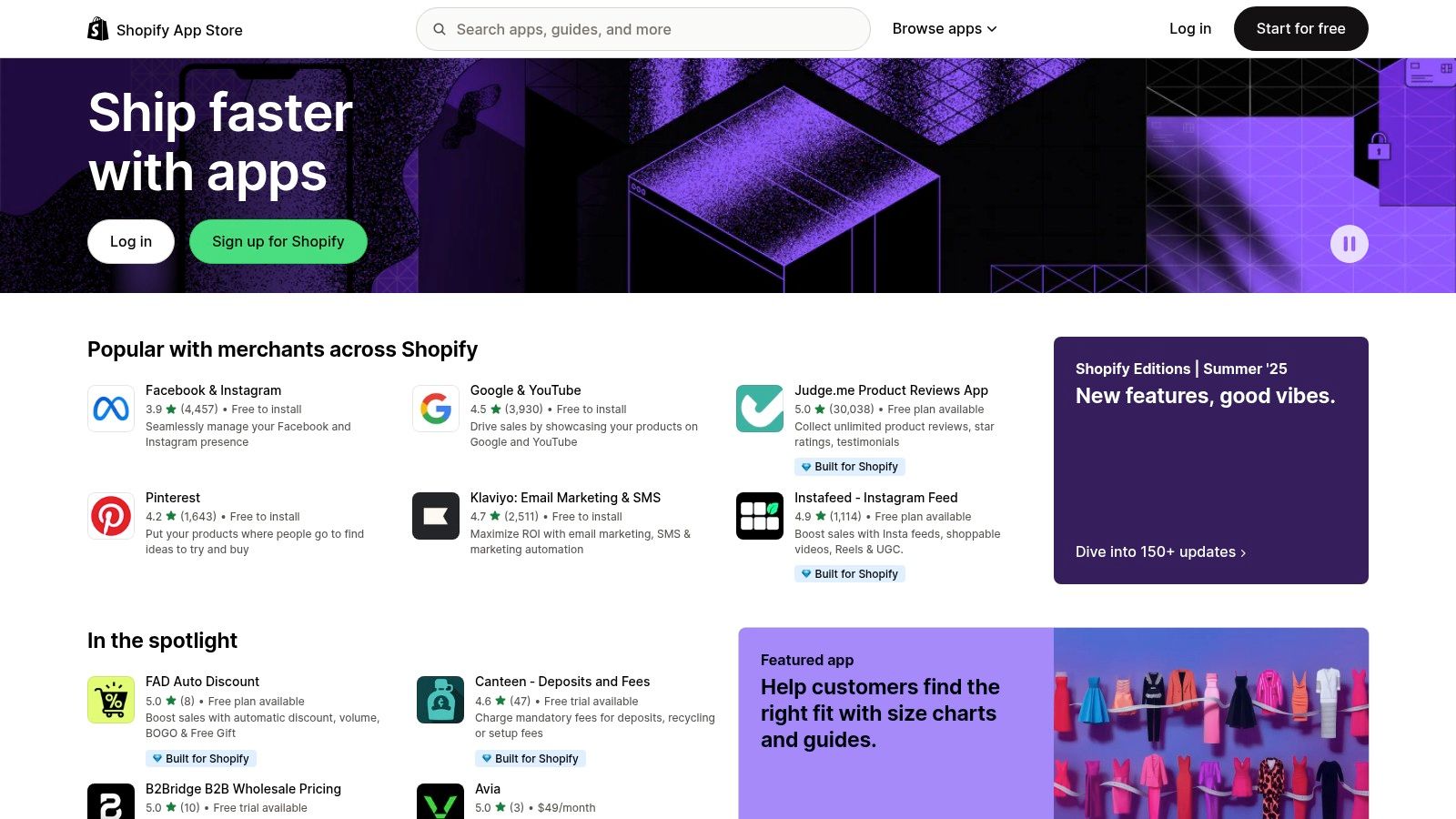
The primary advantage is seamless integration. Apps can be installed with a single click and managed directly from the Shopify admin dashboard, eliminating technical hurdles. From AI-powered chatbots that handle customer queries 24/7 to tools that automatically generate product descriptions and optimize SEO, these apps help merchants save time and boost conversions. Shopify also offers themed collections and detailed reviews, making it easier to find the right tool for specific needs, such as improving customer support or automating merchandising.
Key Details & Differentiators
-
Best For: Ecommerce businesses of all sizes using the Shopify platform who want to quickly deploy AI tools for marketing, sales, and customer service.
-
Unique Feature: Tightly integrated, one-click installation of apps directly into the Shopify ecosystem, plus themed AI app collections curated by Shopify.
-
Pricing: Varies by app; many offer freemium plans, usage-based pricing, or free trials, allowing merchants to test functionality before committing.
-
Pros: Direct and simple app installation, a wide variety of vetted AI tools, and many free or trial options to test before purchase.
-
Cons: Business outcomes can vary based on store traffic and vertical; costs can add up if multiple overlapping apps are used simultaneously.
Website: https://apps.shopify.com/
Top 12 AI Business Tools Comparison
| Platform / Marketplace | Core Features | User Experience / Quality Metrics | Value Proposition | Target Audience | Price Points / Accessibility |
|---|---|---|---|---|---|
| Ekipa AI | Tailored AI strategies in 24h; end-to-end AI delivery; AI-human co-creation | Rapid delivery; actionable strategy reports; hands-on workshops | Cost-effective consulting alternative; high-value free reports | Mid-sized companies; CEOs, CTOs, AI strategists | Free reports; consulting priced below traditional firms |
| Microsoft Commercial Marketplace | Large catalog of certified AI apps; private offers; deep MS integrations | Enterprise procurement; consolidated billing; security vetting | Strong MS ecosystem integration for streamlined buying | Enterprises using Microsoft 365/Azure | Negotiated pricing; partner deals |
| AWS Marketplace (AI/ML) | Wide AI/ML categories; SageMaker deployment; product comparisons | Fast AWS deployment; standardized billing on AWS invoice | Broad vendor choice; deep AWS integration | AWS-first businesses | Usage-based pricing; complex cost models |
| Google Cloud AI & Marketplace | Access to Gemini & Vertex AI models; prebuilt accelerators | Open ecosystem; strong tooling for generative AI | Optimized for GCP users; partner-rich | Google Cloud Platform users | Varies, requires GCP setup |
| Salesforce AgentExchange | Curated AI agents; Einstein Trust Layer for security; low-code building | Enterprise-grade compliance; native CRM integration | Trusted AI for Salesforce clouds | Salesforce customers | Sales-assisted pricing |
| G2 (AI Software Categories) | User-driven rankings; category grids; verified reviews | Fresh peer feedback; comparison grids | Peer validation tool for AI software shortlisting | Broad business users | Free access; some ads and lead forms |
| Capterra (AI Software Directory) | Buyers guides; pricing filters; vendor links | Easy filtering; strong SMB focus | Practical guidance for SMB/mid-market AI tool selection | SMBs and mid-market companies | Free access |
| Product Hunt (AI Tools Discovery) | Daily AI launches; reviews & comments; category tags | Community feedback; early product discovery | Early access to trending AI tools | Early adopters, innovators | Free access |
| HubSpot App Marketplace | AI assistants; workflow automation; app ratings | Contextual AI use with HubSpot CRM; many free trials | AI-powered CRM and GTM enhancements | HubSpot users | Many free tier/trial apps |
| Slack App Directory (AI Productivity) | AI assistants & copilots; security & permissions | Direct in-workspace AI tools; admin controls | AI embedded in team collaboration | Slack-centric organizations | Free and paid apps |
| Atlassian Marketplace (Jira/Confluence AI) | AI automation; labeling; summarization; admin controls | Deep integration with dev workflows; broad vendor options | AI-enhanced engineering and IT processes | Atlassian users | Varies by app |
| Shopify App Store (AI Ecommerce Apps) | AI chatbots; image/video generation; SEO automation | Quick deployment in Shopify; freemium/trial options | AI tools for ecommerce growth | Shopify merchants | Freemium and paid apps |
Final Thoughts
Navigating the expansive landscape of AI can feel overwhelming, but as we've explored, the journey doesn't have to be a solo endeavor. From comprehensive enterprise ecosystems like Microsoft Azure and AWS Marketplace to specialized platforms such as the Shopify App Store and Atlassian Marketplace, the right solution is within reach. The key is shifting your perspective from merely finding a tool to architecting a complete, integrated AI strategy.
This guide has provided a curated look at the discovery platforms and marketplaces that serve as gateways to the best AI tools for business. The critical takeaway is that selection must be driven by strategy, not by hype. Before you commit to a new software subscription, you must have a clear understanding of the specific business problem you are trying to solve, how the tool will integrate with your existing technology stack, and how you will measure its return on investment.
Your Actionable Path Forward
To translate this knowledge into tangible results, consider the following steps:
-
Define Your Core Problem: Start with a precise problem statement. Are you trying to automate customer support inquiries, generate more qualified leads, streamline your software development lifecycle, or optimize your supply chain? A well-defined problem is the foundation of a successful AI implementation. Our guide on AI requirements analysis can help you structure this process effectively.
-
Evaluate Integration and Scalability: The most powerful tool is useless if it doesn't work with your existing systems. Assess the API capabilities, data compatibility, and security protocols of any potential solution. Consider future needs as well; will this tool scale with your business as it grows?
-
Start with a Pilot Project: Avoid a large-scale, high-risk rollout. Select a small, controlled use case to test your chosen AI tool. This allows you to measure impact, gather feedback, and address any implementation challenges before committing significant resources. We've seen this approach work across countless real-world use cases.
-
Foster an AI-Ready Culture: Technology is only one part of the equation. Success hinges on your team's ability to adapt and leverage these new capabilities. As we explored in our AI adoption guide, invest in training, create clear guidelines for AI usage, and encourage a mindset of continuous learning and experimentation.
The Human Element in an AI-Powered Future
Ultimately, the goal is not to replace human ingenuity but to augment it. The best AI tools for business are those that empower your team to work smarter, make better-informed decisions, and focus on high-value strategic tasks that drive real growth. This process of AI co-creation is where true transformation occurs, blending advanced technology with human expertise.
By approaching AI adoption with a clear strategy, a focus on specific business outcomes, and a commitment to empowering your people, you can unlock unprecedented levels of efficiency and innovation. The journey begins not with a tool, but with a vision. If you need guidance shaping that vision, our expert team is here to help.
Ready to move from researching tools to implementing a winning strategy? Ekipa AI specializes in bridging the gap between business challenges and AI solutions. We provide end-to-end AI strategy consulting and implementation support to ensure your investment delivers measurable results. Visit Ekipa AI to build your custom AI roadmap today.



